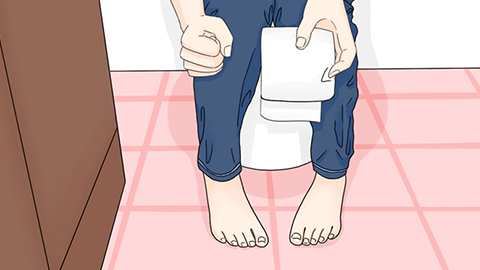How to differentiate the causes of rectal bleeding
Blood in the stool is generally caused by conditions such as hemorrhoids, anal fissures, ulcerative colitis, rectal polyps, or bacterial dysentery. If blood in the stool occurs, it is recommended to promptly visit a正规 hospital for proper diagnosis and identification of the underlying cause. Detailed analysis is as follows:

1. Hemorrhoids
Increased abdominal pressure during defecation may rupture the hemorrhoidal venous plexus, leading to bleeding. The blood is typically bright red, appearing as dripping blood, blood on toilet paper, or blood mixed with stool, usually without significant pain. Adjust your diet by consuming more fiber-rich foods, avoid prolonged sitting, and under medical guidance use medications such as compound azulene suppositories, Ma Yinglong Musk Hemorrhoid Ointment, or Yunnan Baiyao Hemorrhoid Ointment. In severe cases, stapled hemorrhoidopexy (PPH) may be required.
2. Anal Fissure
Dry, hard stools can tear the skin of the anal canal, causing blood in the stool accompanied by severe pain during bowel movements, which typically eases after defecation. Increase fluid intake to soften stools, perform warm water sitz baths after bowel movements, and under medical supervision apply nitroglycerin ointment, recombinant human epidermal growth factor gel, or erythromycin ointment. Severe cases may require surgical excision of the fissure.
3. Ulcerative Colitis
Inflammation and ulcers in the intestinal mucosa often result in bloody, mucopurulent stools, accompanied by abdominal pain and diarrhea. Maintain a light diet and avoid spicy or irritating foods. Under medical guidance, take medications such as mesalamine enteric-coated tablets, sulfasalazine enteric-coated tablets, or prednisolone tablets, and undergo regular follow-up evaluations of intestinal health.
4. Rectal Polyps
Bleeding occurs when the mucosal surface of a polyp is damaged. Blood in the stool is usually bright red, painless, and occasionally associated with polyp prolapse. Avoid coarse or rough foods, seek timely medical evaluation, and consider undergoing endoscopic removal of rectal polyps. Regular postoperative follow-ups are essential to prevent recurrence.
5. Bacterial Dysentery
Infection by Shigella bacteria damages the intestinal mucosa, resulting in pus and blood in the stool, accompanied by fever, abdominal pain, and tenesmus. Maintain good dietary hygiene and isolate if necessary. Under medical supervision, use antibiotics such as norfloxacin capsules, ceftriaxone sodium injection, or azithromycin dispersible tablets, and replenish fluids to prevent dehydration.
In daily life, maintain regular bowel habits and prevent constipation; practice good dietary hygiene to reduce the risk of intestinal infections; undergo regular intestinal screenings for early detection of abnormalities; and seek prompt medical attention when blood in the stool occurs to avoid delayed treatment.




